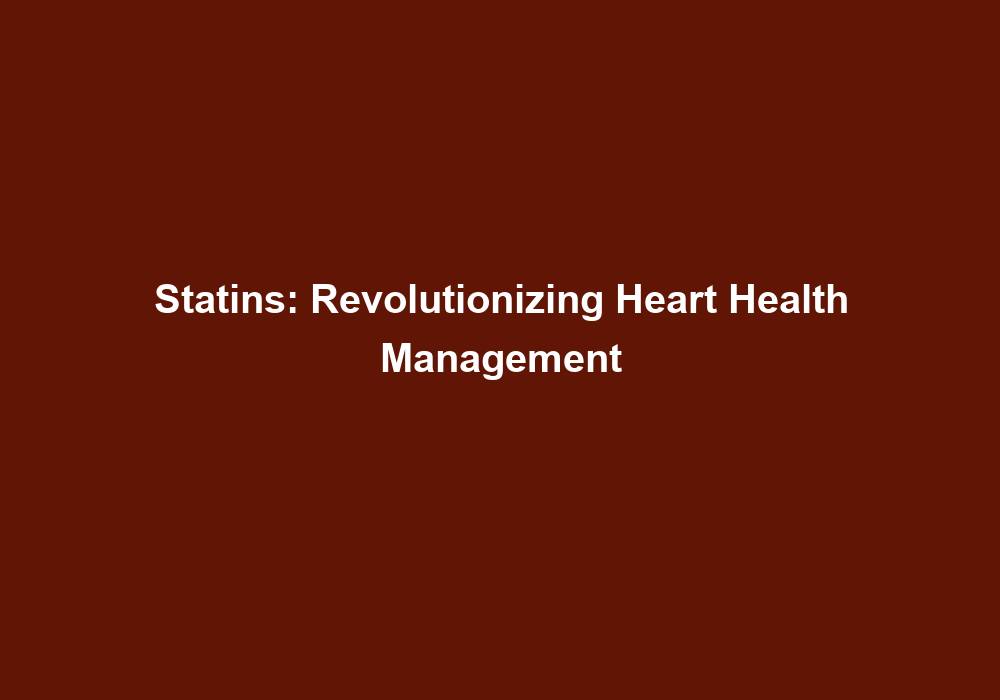Statins: Revolutionizing Heart Health Management
Cardiovascular diseases, including heart attacks and strokes, have become a leading cause of mortality worldwide. As medical research continues to advance, the development of innovative treatments and therapies is crucial in combating these conditions. Among the significant breakthroughs in heart health management, statins have emerged as a game-changer. In this article, we will delve into the world of statins, exploring their mechanism of action, benefits, potential side effects, and their overall impact on revolutionizing heart health management.
Understanding Statins
Statins, scientifically known as HMG-CoA reductase inhibitors, are a class of medications primarily prescribed to lower cholesterol levels in the blood. They work by inhibiting an enzyme called HMG-CoA reductase, which plays a vital role in cholesterol synthesis within the liver. By reducing the production of cholesterol, statins effectively help lower low-density lipoprotein (LDL) cholesterol, often referred to as bad cholesterol, while increasing high-density lipoprotein (HDL) cholesterol, known as good cholesterol.
The Role of Statins in Heart Health Management
1. Lowering Cholesterol Levels
Elevated levels of LDL cholesterol are a significant risk factor for developing cardiovascular diseases. By effectively reducing LDL cholesterol, statins help prevent the build-up of plaque in the arteries, a condition known as atherosclerosis. This, in turn, minimizes the likelihood of heart attacks, strokes, and other cardiovascular events.
Statins work by inhibiting the enzyme HMG-CoA reductase, which is responsible for the production of cholesterol in the liver. By reducing cholesterol synthesis, statins decrease the amount of LDL cholesterol circulating in the blood. This mechanism of action not only lowers LDL cholesterol levels but also increases the levels of HDL cholesterol, which helps remove excess cholesterol from the bloodstream. By optimizing the balance between LDL and HDL cholesterol, statins contribute to a healthier lipid profile, reducing the risk of atherosclerosis and its associated cardiovascular complications.
2. Anti-Inflammatory Effects
Statins have been found to possess anti-inflammatory properties, beyond their cholesterol-lowering effects. Chronic inflammation within the blood vessels plays a crucial role in the progression of atherosclerosis. By reducing inflammation and stabilizing arterial plaques, statins contribute to the overall improvement of heart health.
In addition to their cholesterol-lowering effects, statins have been shown to reduce markers of inflammation within the blood vessels. This anti-inflammatory action helps to stabilize arterial plaques, making them less prone to rupture and cause blood clots. By reducing inflammation and improving plaque stability, statins play a vital role in preventing cardiovascular events such as heart attacks and strokes. Furthermore, the anti-inflammatory effects of statins may also have beneficial effects on other inflammatory conditions, such as arthritis and autoimmune diseases.
3. Blood Clot Prevention
Individuals with atherosclerosis are at a higher risk of developing blood clots. Statins aid in preventing blood clot formation by inhibiting platelet aggregation and reducing the production of clotting factors. This anticoagulant effect significantly reduces the likelihood of potentially life-threatening conditions such as deep vein thrombosis and pulmonary embolism.
Apart from their cholesterol-lowering and anti-inflammatory effects, statins also have anticoagulant properties. These medications inhibit platelet aggregation, preventing the formation of blood clots within the blood vessels. Additionally, statins reduce the production of clotting factors, further reducing the risk of clot formation. By preventing blood clot formation, statins significantly decrease the incidence of thrombotic events, which can have devastating consequences for individuals with atherosclerosis.
4. Endothelial Function Improvement
The endothelium, the inner lining of blood vessels, plays a vital role in maintaining their health and function. Statins have been shown to enhance endothelial function by promoting the production of nitric oxide, a molecule responsible for vasodilation and maintaining blood vessel integrity. By improving endothelial function, statins contribute to better blood flow and overall heart health.
In addition to their cholesterol-lowering, anti-inflammatory, and anticoagulant effects, statins also improve endothelial function. Endothelial cells produce nitric oxide, a molecule that helps relax and dilate blood vessels, promoting better blood flow. Statins enhance the production of nitric oxide, leading to improved endothelial function and increased vasodilation. This, in turn, reduces the workload on the heart and improves overall cardiovascular health.
Potential Side Effects of Statins
While statins have proven to be highly effective in managing heart health, it is important to acknowledge potential side effects associated with their use. It is crucial to consult with healthcare professionals before initiating statin therapy. Some possible side effects may include:
-
Muscle Pain and Weakness: Statins can occasionally lead to muscle pain and weakness, known as myopathy. In rare cases, this can progress to a more severe condition called rhabdomyolysis, which involves muscle breakdown and potential kidney damage.
-
Liver Dysfunction: Although rare, statins can cause liver abnormalities. Regular monitoring of liver function is usually recommended.
-
Digestive Problems: Some individuals may experience gastrointestinal issues such as nausea, constipation, or diarrhea. These side effects are usually mild and temporary.
-
Increased Blood Sugar Levels: Statins have been associated with a slight increase in blood sugar levels, which may be of concern for individuals with diabetes or prediabetes. Regular monitoring is advised in such cases.
It is crucial to note that the benefits of statin therapy often outweigh the potential risks, and the occurrence of severe side effects is rare. Healthcare professionals carefully evaluate the individual’s overall health profile and consider potential drug interactions before prescribing statins.
Conclusion
Statins have revolutionized heart health management by effectively lowering cholesterol levels, reducing inflammation, preventing blood clots, and improving endothelial function. These medications have significantly reduced the incidence of cardiovascular events, enhancing the overall quality of life for individuals at risk. While potential side effects exist, their occurrence is relatively rare, and the benefits of statin therapy should not be overlooked. As always, it is essential to consult with healthcare professionals to determine the most suitable treatment plan and ensure personalized care for optimal heart health.







